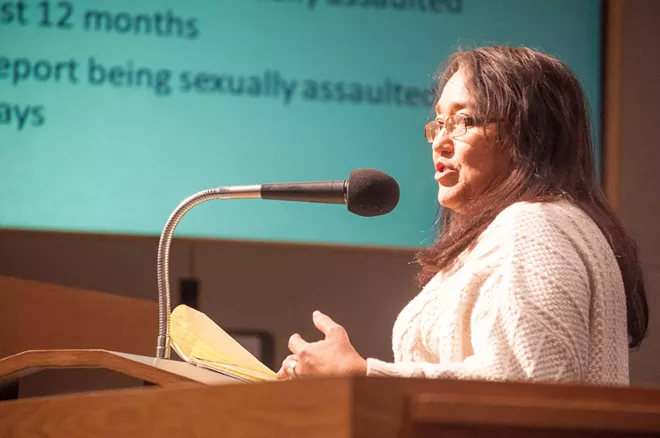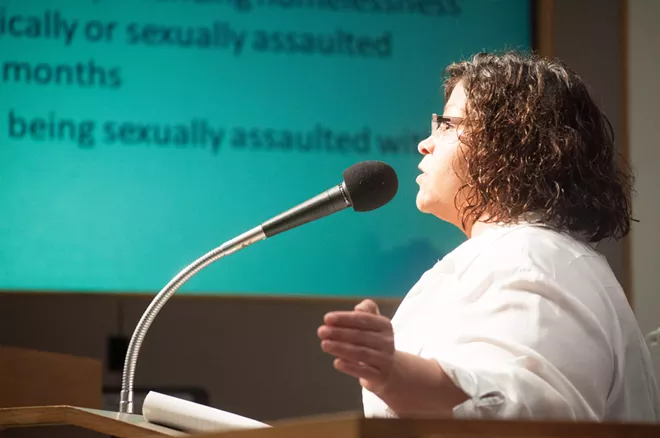Tuesday, September 26, 2017
Spokane City Council wanted your solutions to homelessness: Here they are

When the city of Spokane laid down $150,000 in boulders near Interstate 90 and Bernard Street late last month, in part to discourage homeless people from camping in that area and leaving behind litter, the reaction was swift.
Many took to social media to condemn city leaders, with more than a few suggesting other ways that $150,000 could have been better spent.
So Spokane City Council President Ben Stuckart invited concerned citizens to come share their solutions for homelessness. Dozens took him up on that offer at the Monday, Sept. 25 meeting, which was set aside as an open forum.
And while there was the airing of grievances, many offered fixes to problems:
Storage lockers for homeless people to keep their possessions in:
Stuckart mentioned he'd heard this suggestion from multiple people leading up to the forum Monday.
More medical access on-site at shelters to minimize fire calls:
Richie Andal, a man who's been living at the House of Charity shelter, told the council that since the boulders went in and moved people toward the nearby shelters, he thought there'd been more of a burden placed on the shelter. Specifically, he said it seemed like there'd been more fire department calls, with seven calls to the shelter on Friday last week.
"A lot of people there are fine around two or three people, but get them around 10 or 12 and they're having meltdowns," Andal said. "As far as solutions, maybe some more medical services on hand so the paramedics don’t have to come out all the time? I know two of those people were just overstressed."
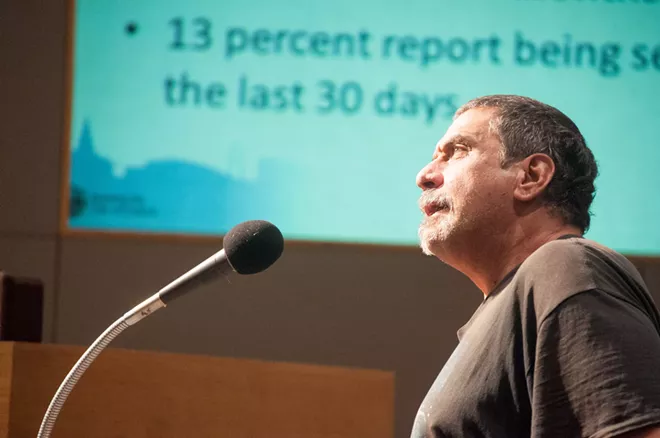
Andal told the council they were doing a great job with services, but just wanted to make sure they knew the burden the shelter was
The council asked Catholic Charities' Rob McCann, who was in the audience along with other homeless service and shelter providers, to confirm if more people were staying at the shelter, which he did.
"If there was another shelter in town that would take the folks we have,
I’d stand right up there
and do the happy dance."
— Rob McCann, Catholic Charities

When asked if smaller shelter spaces might decrease issues, including crowding and norovirus outbreaks that took place there last winter, McCann said he'd love it if other shelters would take the same folks House of Charity
Get rid of the sit-lie ordinance:
One speaker chastised Spokane's self-designation as a "Compassionate City," calling out the basalt and other environmental designs meant to keep people from hanging around, and specifically calling out the sit-lie ordinance as a rule that only targets homeless people, which he tested.

"I was dressed in a suit with a briefcase sitting on the edge of the same flower pot, and then someone with a
Stuckart said he would be happy to consider repealing the ordinance if there were another rule in place that could help deal with the problems that
Put a just-cause eviction ordinance in place:
One of the best ways to fix homelessness is to prevent it in the first place, multiple speakers told the council.
"Whenever we’re having a conversation about homelessness, need to talk about why we are adding to the population every month," said Terri Anderson, an organizer with the Tenants Union of Washington State. "Tenants do not have protection. They can be served with
Ban the box for employment and housing:
Among the
"Some of the specific solutions would be to ban that box," said Jan Shannon, a part-time volunteer pastor at Westminster United Church of Christ. "If somebody has done the crime and done the time, for God’s
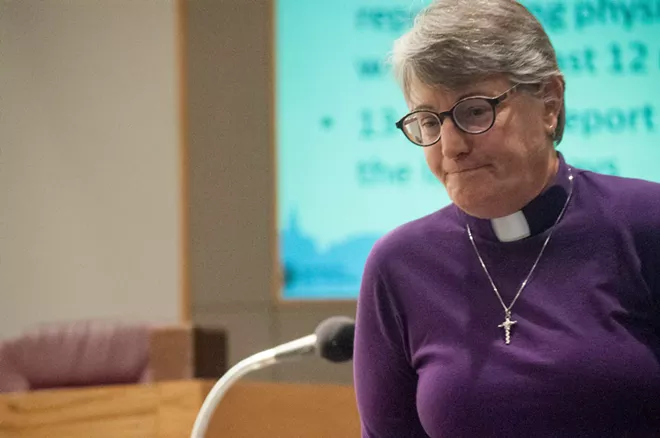
More mental health advocates and resources
"What I've learned is that past the drug addiction, past the alcohol addiction, I think what we need is some mental health advocates who really understand trauma and how to overcome it," said Mercy Aguilar, a woman who is homeless. "Everybody that I have met on the streets, it all comes back to trauma, whether it be childhood or PTSD from being a veteran. To force them into a shelter, where they’re housed with all these other people, it’s too much."
Create
Multiple speakers said there is a dire need for a shelter that is welcoming to people in the LGBTQ community, especially those who are transgender.
Jade Ann Annasta, a transgender woman who shared her experiences staying at shelters pre- and post-transition, and said she not only had to initially hide who she
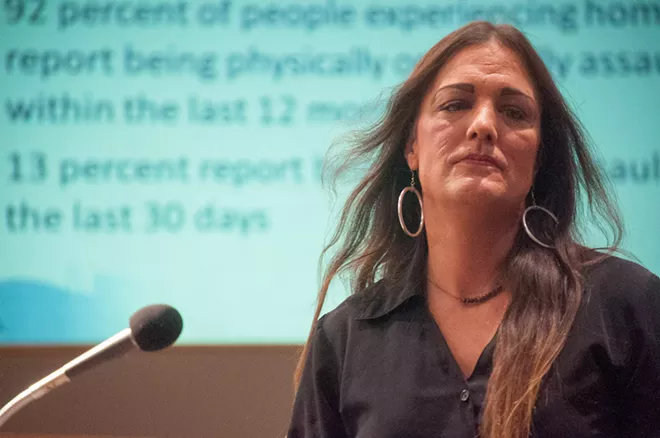
The council gave the shelters a chance to answer whether they accepted people or not.
Major Ken Perine, with the Salvation Army, said they do accept all people who want help, and wanted to know who had turned the woman away for being transgender.
Phil Altmeyer, director of the Union Gospel Mission, said they do turn people away, including transgender individuals, if they think there will be a problem for their safety or the safety of others.
"We have chosen to say our shelter will be safe, so not only that person, but the people staying there, will be safe," Altmeyer said.
Assure more affordable housing:
Among suggestions to make sure the city has more affordable housing:
- infill on empty lots, which doesn't have to mean large apartment buildings;
- fill "zombie" houses, which sit empty after being foreclosed on, often for years
James Earl, who referred to himself as an "avid cannabis smoker," suggested the city should get the state to share more of the profits from those sales with them to not only go toward

Stuckart said he'd love it if the state gave the city more marijuana revenue, and added that the city actually received less of that money this year than last year, even as sales have grown. This year's amount doesn't even cover the cost of one full-time police officer, he said.
Work on the voucher system:
Multiple people who were either homeless themselves, or worked with others who are, said that even when people get housing vouchers, they often wait for months, or more than a year, to find a place to live.
Give them meaningful work:
The city's panhandlers may soon be offered volunteer work with a stipend as part of a program called "Hope Works," modeled after an
The program will aim to help a handful of people volunteer in opportunities that will build their job skills, and be the first step toward connecting with services. Because it will be volunteer work, people won't need to have an ID already, though part of the program will likely be helping folks who want one get on the path to doing so, explained Mark Richard, president of the Downtown Spokane Partnership.
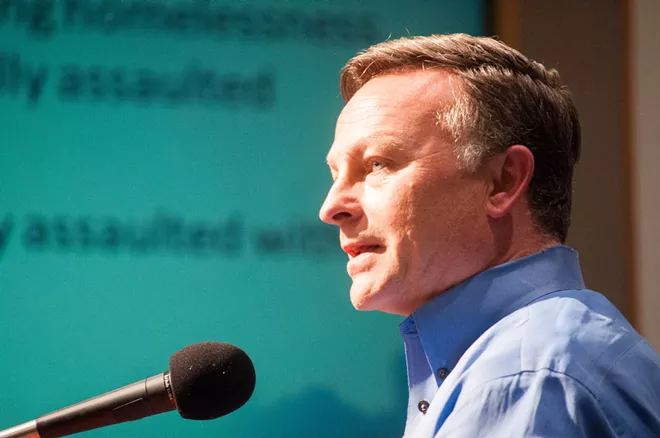
Other organizations partnering to make "Hope Works" happen include Goodwill, Catholic Charities and the city.
Currently, the program is getting set up, and they still need about $37,000, Richard said.
Stuckart, who said the city will cover that gap, added that he planned to get that item on the agenda as soon as possible.
Tags: homelessness , forum , solutions , Spokane , Spokane City Council , Ben Stuckart , homeless , housing , affordability , issues , News , Image

